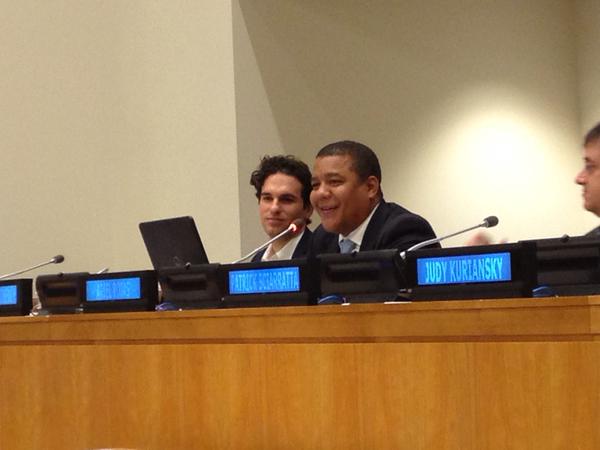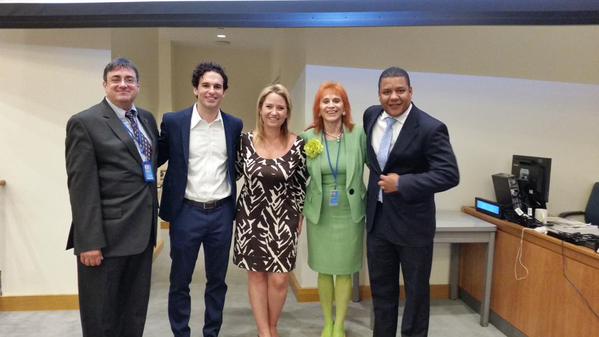“Social Innovation, Youth Engagement and the SDGs.”
Presentation authored by TDN President & Founder Ariel Rojas at the panel “The Future is Now: For NGOs, Succession is Sustainability,” during the 2015 NGO Conference at the United Nations* on August 27th, 2015.

What does social innovation mean to all of us? Regardless of our ideology, religious beliefs, cultural upbringing, gender identity, or socioeconomic background, we all have the assumption that social innovation should be always connected to re-imagining social systems, to re-imagining the Future with capital F. Yes, because we applied the concept of Big Revolutions to that Future with capital F, and Big Revolutions are matters of Big People. This sounds very exciting, no? However, I’m not here in front of you to talk about Big Revolutions and Big People. As representatives of the global civil society attending this transcending forum organized by the Friendship Ambassadors Foundation with the support of various U.N. State Members, I would like you to think about social innovation as a way to understand our youngest generation’s local language and the context of their dreams and social challenges. These days, young people are full of gigantic and difficult questions because they are exposed to a social reality that is 1,000 times more complex than the reality of the 1940’s when the United Nations was created and the statement “We the People…” opened a new and brighter horizon for humankind.
The National Resource Center for Youth Development asserts that “in order for youth to be prepared to work in partnership with adults, they need to develop and/or enhance their leadership skills.” An effective way to commit ourselves to this ideal is to reflect on the existing structure at NGOs and develop new approaches for a more inclusive and sustainable environment.
As representatives of the global civil society, we cannot apply the idea of social innovation regarding youth development in a vacuum. We must take into consideration the different nuances of local cultures, either in the Global North or the Global South, and redirect our engagement with the business sector with a better understanding of the principles of Social Return On Investment (SROI).
Engaging with culture is closely aligned with participatory development methods, since it entails starting where young people are, respecting and recognizing their ability to decide and act on what changes are important in their lives. Engaging with culture means dialogue, working with channels of communication that are favored and valued within their communities, working within the ‘cultural logic’ of those communities, supporting how they define their own solutions which may be adopted because those solutions work through rather than ignore or confound their understanding of the world.
“Future development cannot be imposed by a few elites at the top. Instead it will come from more knowledge exchanges with people connecting, engaging, challenging and innovating. Because of the global demographic dividend and almost ubiquitous connectivity there are now many more global citizens that can participate in such development debates.” Following this World Bank statement, there is a strategic urgency to put in place appropriate policies which take advantage of the “demographic dividend” for most countries and to promote investments in human capital, especially in young people, as one of the mechanisms for growth. As a result, NGOs that promote youth access to quality education, youth capacity building programs and proactive youth leadership roles in a multi-dimensional and cross-sectional way are not only going to secure an organic succession from one generation to the next, but are also going to benefit from a healthier youth population, better educational outcomes and fewer economic pressures at home.
As stressed in the 2015 Commission for Social Development Resolution on Policies and Programmes involving Youth, the full and effective participation of youth as civil society representatives is essential to implementing the World Programme of Action for Youth and achieving the Sustainable Development Goals (SDGs). The theme of this year’s International Youth Day was ‘Youth Civic Engagement.’ The engagement and participation of youth is essential to achieve sustainable human development. Yet often the opportunities for youth to engage politically, economically and socially are low or non-existent. The U.N. Secretary-General stated during this year’s ECOSOC Youth Forum: “in this landmark year, as leaders prepare to adopt a bold new vision for sustainable development, the engagement of youth is more valuable than ever. At this critical moment in history, I call on young people to demand and foster the dramatic progress so urgently needed in our world.”
Finally, I would like to give you two quick examples of how my social enterprise organization Transdiaspora Network is jumping in to secure the successful implementation of the SDGs.
First example… Our two organization will be engaged in a various local partnerships to translate the new Sustainable Development Goals (SDGs) from a U.N.-centered document to a more youth-friendly language. This collaboration will allow us to improve the long-term strategy on how governments and the civil society sector effectively engage the youngest generation in the implementation and fulfillment of this new people-oriented global agenda for development.
Second example… Currently, our team is promoting the implementation of the TDN Cross-cultural Youth Coalition™ via partnerships other regional/local civil society stakeholders to mobilize all available resources in a spirit of global solidarity with one of the most vulnerable section of the population: the youth. The Cross-cultural Youth Coalition (CYC) is a collaborative initiative to be developed and implemented in Fiscal Year 2015-2016 under the framework of the newly adopted Sustainable Development Goals (SDGs), and has been presented as a concrete way to foster global solidarity in the area of youth capacity building and bridge the existing gap to support sub-national alternative health promotion projects.
Although the world has seen remarkable progress under the U.N. Millennium Development Goals (MDGs), Member States and all stakeholders need to adapt to the changing populations of youth and cultural entities in order to succeed in the Agenda 2030. This will not only require engaging youth and building their capacity to participate as leaders in their governments and institutions in order to successfully serve their communities, but will also rely on developing sustainable cross-cultural and international networks for this to happen. As it has been said before, the United Nations is developing a new paradigm for cooperation among State Members and other stakeholders. However, we the people (which means we, the NGOs) should embrace social innovation as the new shifting paradigm to bring young people’s voice with their endless network of solutions yet to be discovered. Let’s bring them to the forefront of this ambitious, challenging and futuristic endeavor from a cross-generational thinking. Paraphrasing Ted Turner, I will conclude by saying: if all of us proactively bring in young people now, the would-be leaders of 2030 are going to realize soon that our planet is the address of a sustainable paradise. Thank you!

L to R: Patrick Sciarratta, Special Adviser, UN Permanent Mission of São Tomé and Principe (moderator); Juan Elias Chebly, Coordinator, UN Millennium Campaign; Jennifer Kushell, Founder & CEO, Youth Success Now; Dr. Judy Kuriansky, UN Representative, International Association of Applied Psychology; Ariel Rojas, Founder & CEO, Transdiaspora Network.
* Organized by the Friendship Ambassadors Foundation, with the support the various U.N. State Members, the 2015 NGO Conference celebrated the 70th Anniversary of the United Nations, and brought together a vast diversity of international civil society constituencies, NGO stakeholders, and celebrities. The conference provided an important opportunity to enrich civil society’s resources toward the implementation of the U.N.’s new global agenda: the Sustainable Development Goals (SDGs).
Buzz
- 11/04/2022 Latino Impact Summit - TDN President/Founder Ariel Rojas attended this event at the United Nations... read more>>
- 10/27/2022 Latin Grammy Awards - TDN Artistic Ambassador Glenda del Monte Escalante is a nominee for the next edition of the Latin Grammys... read more>>
- 10/24/2022 Heritage Celebration - TDN President/Founder Ariel Rojas attend community event Quisqueya: A Celebration of Haitian and Dominican Heritage... read more>>
- 10/21/2022 TDN / UN Women - TDN President/Founder Ariel Rojas and TDN Youth Ambassador Alicia Rando meet with UN Women representative... read more>>
- 09/09/2022 Book of Condolence - Because of Queen Elizabeth's death, TDN President/Founder Ariel Rojas signs book of condolence... read more>>
